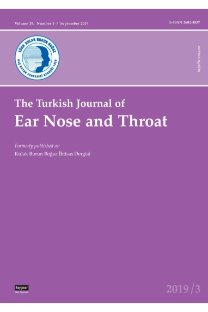Çocukluk çağının periferal vestibüler hastalıkları: Uç olgu sunumu
Vertigo çocukluk çağında nadir olarak karşılaşılan bir rahatsızlıktır. Çocukluk çağında görülen vertigonun et- yolojisi yetişkinlere göre farklılıklar göstermektedir. Hem merkezi hem de periferik nedenler çocuklarda vertigoya neden olabilmektedir. Çocukluk vertigoların- da ayrıntılı öykü alınması, fizik muayene, odyometrik inceleme ve vestibüler fonksiyon testlerinin yapılması gerekir. Bu yazıda, çocukluk çağında vestibüler nörit tanısı konan bir hasta ve benign paroksismal pozisyo- nel vertigo tanısı konan iki hasta, tanı yöntemleri ve te- davi sonuçlarıyla birlikte sunuldu. Hastaların yaşları 10-14 arasında değişmekteydi. Vestibüler nörit tanısı konan olguya vestibüler rehabilitasyon uygulanırken, benign paroksismal pozisyonel vertigo tanısı konan iki hastaya kanalit repozisyon manevrası uygulandı. Üç olguda da semptomların tamamen kaybolduğu izlendi
Anahtar Kelimeler:
Çocuk, periferik vertigo, vestibülernörinit, pozisyonel vertigo
Childhood peripheral vestibular disorders: a report of three cases
Vertigo is uncommon in childhood. Its etiology is different from that of adults. Both Central and peripher al disorders may give rise to vertigo symptoms in pediatric patients. The evaluation of vertigo in children requires a detailed history taking, clinical examination, audiometric assessment, and vestibular function tests. We present three pediatric patients with vertigo symptoms, together with treatment methods and results of treatment. Their ages ranged from 10 to 14 years. The diagnoses were vestibular neuritis in one patient, and benign paroxismal posi- tional vertigo in two patients. Treatment was comprised of vestibular rehabilitation for vestibular neu ritis, and canalith repositioning maneuver for benign paroxismal positional vertigo. Ali the patients benefited well from the procedures applied.
Keywords:
Child, vertigo/peripheral, vestibular neuronitis, positional vertigo,
___
- Choung YH, Park K, Moon SK, Kim CH, Ryu SJ. Various causes and clinical characteristics in vertigo in children with normal eardrums. Int J Pediatr Otorhinolaryngol 2003;67:889-94.
- Fried MP. The evaluation of dizziness in children. Laryngoscope 1980;90:1548-60.
- Basser LS. Benign paroxysmal vertigo of childhood. (A variety of vestibular neuronitis). Brain 1964;87:141-52.
- Katsarkas A, Kirkham TH. Paroxysmal positional ver- tigo-a study of 255 cases. J Otolaryngol 1978;7:320-30.
- Drigo P, Carli G, Laverda AM. Benign paroxysmal ver- tigo of childhood. Brain Dev 2001;23:38-41.
- Uneri A, Turkdogan D. Evaluation of vestibular func- tions in children with vertigo attacks. Arch Dis Child 2003;88:510-1.
- Baloh RW, Honrubia V. Childhood onset of benign positional vertigo. Neurology 1998;50:1494-6.
- Taborelli G, Melagrana A, D’Agostino R, Tarantino V, Calveo MG, Calevo. Vestibular neuronitis in children: study of medium and long term follow-up. Int J Pediatr Otorhinolaryngol 2000;54:117-21.
- Tahara T, Sekitani T, Imate Y, Kanesada K, Okami M. Vestibular neuronitis in children. Acta Otolaryngol Suppl 1993;503:49-52.
- ISSN: 2602-4837
- Yayın Aralığı: Yılda 4 Sayı
- Başlangıç: 1991
- Yayıncı: İstanbul Üniversitesi
Sayıdaki Diğer Makaleler
Guinea pigde propilen glikol ile oluşturulan otitis mediada sistemik prednisolonun etkisi
Fatma Tülin KAYHAN, Zeynep ALGÜN
Posterior etmoid sinüste alışılmadık bir yabancı cisim: Bilye
Mehmet EKEN, Arif ŞANLI, Sedat AYDIN, Ömer TAŞDEMİR
Ahmet Emre SÜSLÜ, Oğuz ÖĞRETMENOĞLU, Tevfik Metin ÖNERCİ, Ömer Taşkın YÜCEL
Tiroid tümörüne benzeyen trakeal adenoid kistik karsinom
Osman BAHADIR, Mehmet İMAMOĞLU, Ömer KORKMAZ, Ümit ÇOBANOĞLU
Mehmet EKEN, Cenk EVREN, Günay ATEŞ, Ziya BOZKURT, Arif ŞANLI, Sedat AYDIN
Çocukluk çağının periferal vestibüler hastalıkları: Uç olgu sunumu
Erkan TARHAN, Volkan AKDOĞAN, Osman Nuri ÖZGİRGİN, Levent Naci ÖZLÜOĞLU
